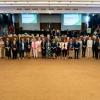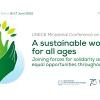Press Releases
Displaying Results 1 - 15 of 15
In many countries in Europe, North America and Central Asia, more than one in four older persons is affected by depression. Later life brings transitions such as retirement, bereavement, chronic illness, and changes to living arrangements and caregiving responsibilities that can increase stress,
At any age, intersecting factors such as poverty, disability, social isolation, and exposure to abuse can increase the risk of vulnerability and weaken resilience in the case of adverse events. The COVID-19 pandemic, rising inflation, natural disasters, and war are examples of adverse events that
The 5th UNECE Ministerial Conference on Ageing in Rome closed today with the adoption of the 2022 Rome Ministerial Declaration on Ageing “a Sustainable Society for All Ages: Joining Forces for Solidarity and Equal Opportunities throughout life”.
The declaration reconfirms countries’ commitment to
Population ageing is transforming the demographic structure of countries in the UNECE region. Over the past 20 years, the number of older persons has risen by 70.3 million, and their proportion increased from 13.4 to 17.5 per cent in 2022, according to United Nations population estimates. Rising
The population of the UNECE region is ageing: one in four people will be 65 years old or above by 2050 compared to one in six today. Population ageing has social and economic implications for which societies need to prepare. This requires a coordinated, whole-of-government and whole-of-society
The 21st Century is characterized by increasing digitalisation. As more and more everyday services move online, ‘offliners’ risk being excluded in an era that embraces fast-changing innovation in digital technology. This predominantly concerns older
The Guidelines launched today by UNECE call for the development of a Strategic Framework for Mainstreaming Ageing to ensure its systematic consideration and integration in public policies.
By 2050, about one in every four persons in the UNECE region will be over the age of 65. Population ageing
COVID-19 crisis shows the specific needs of older persons must receive more attention in emergencies
The COVID-19 pandemic has highlighted the vulnerability of older persons, who have borne the brunt of severe illness and mortality as well as of acute loneliness and isolation. Up to September 2020, nearly 9 out of 10 COVID-19 related deaths reported in the UNECE region were among adults aged 65
Statistics on social and demographic topics are usually produced from surveys of individuals living in private households. But what about older people who are not part of a private household, but who instead live in an institution, such as a care home or assisted living centre? Such people are
Today, almost 98 million people in the EU-28 are aged 65 years and over - some 19.2 per cent of the total population. With this share set to continue rising over the coming decades, ensuring “active ageing” through healthy and independent living and maximising older populations’ contributions to
The UNECE Ministerial Conference on Ageing held on 18-20 September 2012 in Vienna, Austria, concluded with the adoption of the Ministerial Declaration “Ensuring a society for all ages: promoting quality of life and active ageing”. The Declaration outlines priority directions for the third cycle
Over the past 10 years, UNECE member States have made significant progress in adapting social protection systems, promoting health and independent living and adjusting labour markets to the needs of an increasingly ageing population. However, these are also among the top areas where major
The UNECE Ministerial Conference “Ensuring a society for all ages: promoting quality of life and active ageing” will take place from 18 to 20 September 2012 in Vienna, Austria. The Conference will mark the 30th anniversary of the first World Assembly on Ageing, which also took place in Vienna in
Geneva National ageing focal points from across the UNECE region are gathering in Geneva for the Fourth meeting of the UNECE Working Group on Ageing on 21-22 November 2011. Active ageing and quality of life in old age will be the focus of a special in-depth discussion with latest research
Geneva The UNECE Population Unit is preparing a Road Map on Mainstreaming Ageing for the Republic of Moldova. Based on an in-depth appraisal of the situation in the country, recommendations will be prepared on how to implement internationally agreed policy standards, as set out in the






